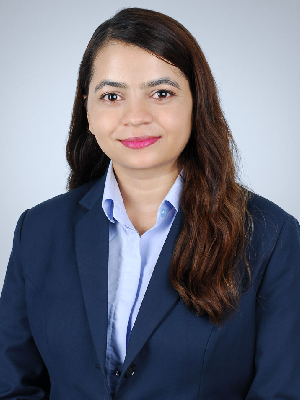Asha Khanal is no stranger to breaking down barriers. An electrical engineer with the Nepal Electricity Authority, she's been holding on her own in a male dominated field ever since graduating from Nepal's University of Tribhuvan. From installing solar panels in remote areas of Mt Everest Base Camp, to dreaming of a single regional South Asian energy grid, Asha's career trajectory is proof that the impossible is possible – yet she wants to achieve more, dream bigger.
"In my office, most of the women engineers are assigned to do paperwork instead of software related works, though they have some capabilities. The SAR100 training has now filled that gap. I am much more confident."
The training Asha refers to is the WePOWER SAR100 training program, delivered by the Asian Institute of Technology (AIT). Over 8 months from 2023 - 2024, 101 talented and tenacious female engineers – Asha included - from Bangladesh, Bhutan, India, Maldives, Nepal, Pakistan and Sri Lanka, participated in a series of online modules and research projects, collaborating on some of the South Asian region's most pressing energy issues. With the training course wrapping in early March, the women converged on Bangkok for the final leg of their SAR100 journey: a busy week of learning, innovation, and networking.
The course and its final capstone week were made possible through the AU $32 million South Asia Regional Infrastructure Connectivity (SARIC) Program, which is funded by the Australian Government and implemented by Palladium alongside the World Bank and the International Finance Corporation.
Alongside her 100 SAR100 peers, Asha has made the most of the inspiring capstone week experience. She relished the opportunity to visit Wang Noi power plant, south of Bangkok, as well as visits to Energy Absolute and Amita Technologies, gaining firsthand insights into lithium battery manufacturing and storage, and electric vehicle production.
The icing on the cake was a visit to the United Nations Economic and Social Commission for Asia and the Pacific mission in Bangkok, to participate in the Southeast Asia Green Energy Co-operation & Exchange Forum.
As for her final capstone research project – the culmination of 8 months' hard work and collaboration with the rest of her diverse SAR100 assignment group – Asha speaks highly of the knowledge she's now gained. Her group project, titled ‘Market Insights and Analysis of APV and FPV: Present and Forecasted Scenarios', allowed her to dive in and explore regional market trends and opportunities.
"The training provided hands on experience, including technical knowledge and software which is going to be so useful in our workplaces. Before, I had some doubts when handling software. Now I feel much more knowledgeable in power sector engineering. I also have a more positive perception of cross border electricity trade (CBET)."
There's no doubt that Asha's skills will be put to good use back home in Nepal.
With its many river basins, almost the totality of the electricity generated in Nepal comes from hydropower. 81% of the population did not have access to electricity in 2000, but with a significant push from the Nepalese government, only 6% of the country's population remain without access today. When it comes to CBET, India is Nepal's primary trading partner.
Asha is proud to be part of this ever-evolving industry. "I'm inspired to work hard and in a dedicated way to my sector."
Technical skills aside, the SAR100 training also provided an important space for networking. In Bangkok, a mid-week speed networking event hosted by SARIC TNS saw Asha come together with her peers to share common challenges and hopes for the future.
"Yes, I compromised my office work, family events and gatherings, but the SAR100 training was worth more than that. It was a nice platform for interacting with 101 women engineers [across South Asia]. I always believe that networking is power!"
With SAR100 graduation certificate in hand, Asha returns home to Nepal with more knowledge, a growth mindset, and 100 powerful connections with likeminded female engineers. She looks forward to a bright future.
"I have a more positive attitude now. My mindset has shifted. I can do everything."

